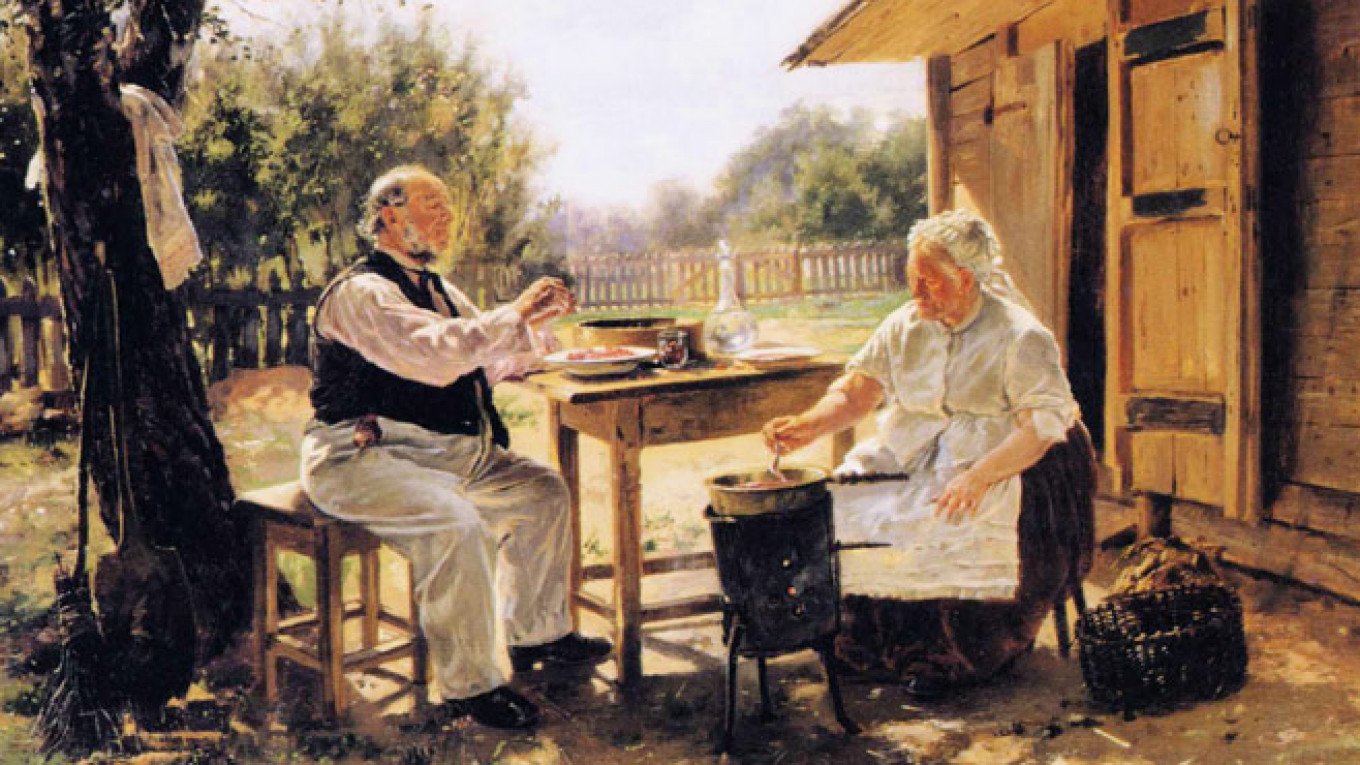Пря́ный: spiced, savory, piquant
Visitors to Moscow this week could be forgiven for thinking they'd arrived not in a city, but into a large, outdoor food storage facility. Huge jam pots dot the squares, piles of watermelons cover street corners, and baskets of apples decorate churches for a religious holiday. It's not yet clear if it's what Russians call урожайный год (a bumper crop year), but the harvest of berries and fruits have been more than enough to keep home canners busy.
And since we are trying not to think about the various catastrophes that tend to descend upon Russia in the month of August, we'll think about traditional Russian sweets, both literal and figurative, instead.
In the old days — and perhaps now in the new days of food sanctions and double-digit inflation — home cooks had lots of ways of preserving the summer bounty. Take cherries (вишни): Их сушили (they dried them); мочили (pickled them); мариновали (marinated them); делали из них компот (steeped them to make a drink); and of course варили варенье (made jam).
Варенье (jam, more or less) contains the method of its making in its name. It's from the verb варить (to boil), which is what you do with fruit or berries and sugar. Some people make пятиминутка (five-minute jam), and some don't make jam at all, but rather ягоды, перетёртые с сахаром (berries mixed with sugar).
Варенье is thinner and usually more concentrated in flavor than джем (jam), which Russians tend to dismiss. Sometimes they damn with faint praise: Я тебе дам другого варенья, английского, оно довольно вкусное (I'll give you different jam — it's English and tastes good enough).
One of the great rites of initiation for foreigners in Russia is their first traditional чаепитие — a complex tea drinking ceremony that is as distant from a teabag dunked in a mug of hot water as a five-star restaurant dinner is from a Happy Meal. This is where you learn that варенье is not spread on toast, but served with tea.
It's first placed in a large bowl with a funny name: Мы сидели на диване перед круглым столиком, на котором стояло варенье в вазочке (We sat on the couch at a round little table with a dish — literally "vase" — of jam). And then it's doled out in other dishes that have a different funny name: У каждого гостя кусок торта на тарелке и розетка с вареньем (Each guest had a slice of cake on a plate and a little dish — literally "rosette" — of jam). And then it's eaten off a spoon in between sips of tea.
Often you'll be served another very traditional Russian sweet with tea, пряник — something like gingerbread, only sometimes very hard, as if a gingersnap had married a lollipop. Like варенье, its name is also the key to how it's made, or rather what it's made from. The name comes from пряный, an adjective that means spiced or savory. Traditionally in Russia, пряный referred to the strong flavors of root vegetables: хрен (horseradish); редька (radish); лук (onion); and пастернак (parsnip). And certain imported spices: перец (pepper); гвоздика (clove); корица (cinnamon); and мускат (nutmeg).
Пряник is the carrot in the Russian version of carrot and stick: кнут и пряник (literally, whip and gingerbread). Кнут и пряник — ключевые слова любого тоталитарного режима (The carrot and stick are key words for any totalitarian regime).
May all your пряники be served with tea and not a jail sentence.
Michele A. Berdy, a Moscow-based translator and interpreter, is author of "The Russian Word's Worth" (Glas), a collection of her columns.
A Message from The Moscow Times:
Dear readers,
We are facing unprecedented challenges. Russia's Prosecutor General's Office has designated The Moscow Times as an "undesirable" organization, criminalizing our work and putting our staff at risk of prosecution. This follows our earlier unjust labeling as a "foreign agent."
These actions are direct attempts to silence independent journalism in Russia. The authorities claim our work "discredits the decisions of the Russian leadership." We see things differently: we strive to provide accurate, unbiased reporting on Russia.
We, the journalists of The Moscow Times, refuse to be silenced. But to continue our work, we need your help.
Your support, no matter how small, makes a world of difference. If you can, please support us monthly starting from just $2. It's quick to set up, and every contribution makes a significant impact.
By supporting The Moscow Times, you're defending open, independent journalism in the face of repression. Thank you for standing with us.
Remind me later.








